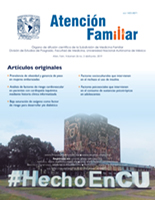Sociocultural Factors Involved in the Rejection of the Use of Insulin
Main Article Content
Abstract
Objective: To determine the sociocultural factors involved in the rejection of the use of insulin in patients with diabetes mellitus type 2 (dm2). Methods: A cross-sectional study conducted from March 2015 to February 2018. 314 patients were studied, diagnosed with dm2 in the Family Medicine Unit (fmu) No. 58 of the Mexican Social Security Institute (imss) in Tepalcatepec Michoacán, México. Prior signed consent, a demographic data survey and the Graffar-Méndez Castellanos scale were applied. Descriptive statistics for the analysis of the studied variables was used. Results: the studied population included 179 women (57%) and 135 men (43%); schooling was null or basic in 211 participants (67.2%); 141 were dedicated to housework (44.9%), and 233 were workers (74.2%). 211 participants mentioned that they were proposed to use insulin (67.19%), however, they referred not receiving relevant information from health personnel about this treatment; the reason for the rejection of insulin use was fear of blindness in 127 patients (40.4%), most of them only had basic education and a low socio-economic level. Conclusions: There is a false belief in the use of insulin in patients who are afraid of becoming blind, which was related to low socio-economic education, as well as the lack of appropriate information by health personnel, factors that contribute to the delay in insulinisation with all the health consequences that this entails.


